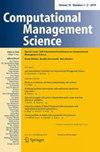基于LASSO的可预测性和参数不确定性下的资产配置
IF 1.3
Q3 SOCIAL SCIENCES, MATHEMATICAL METHODS
引用次数: 1
摘要
我们考虑一个短期投资者,他利用股票和债券的回报可预测性来最大化均值方差效用。由于真实参数是未知的,我们采用LASSO线性回归形式的投资组合优化,以减轻与估计误差相关的问题。由于标准交叉验证依赖于i.i.d回报的假设,我们提出了一种新的交叉验证类型,从多元正态分布中抽样的模拟回报中选择$$ \lambda $$ λ。我们发现所选择的$$ \lambda $$ λ与期望效用之间呈反u形关系,并且我们表明,随着用于估计参数的观测值的增加,$$ \lambda $$ λ的最优值下降。我们最后展示了我们的策略如何优于一些常用的基准。本文章由计算机程序翻译,如有差异,请以英文原文为准。
Asset allocation under predictability and parameter uncertainty using LASSO
We consider a short-term investor who exploits return predictability in stocks and bonds to maximize mean-variance utility. Since the true parameters are unknown, we resort to portfolio optimization in form of linear regression with LASSO in order to mitigate problems related to estimation errors. As standard cross-validation relies on the assumption of i.i.d. returns, we propose a new type of cross-validation that selects $$ \lambda $$ λ from simulated returns sampled from a multivariate normal distribution. We find an inverse U-shaped relationship between the selected $$ \lambda $$ λ and the expected utility, and we show that the optimal value of $$ \lambda $$ λ declines as the number of observations used to estimate the parameters increases. We finally show how our strategy outperforms some commonly employed benchmarks.
求助全文
通过发布文献求助,成功后即可免费获取论文全文。
去求助
来源期刊

Computational Management Science
SOCIAL SCIENCES, MATHEMATICAL METHODS-
CiteScore
1.90
自引率
11.10%
发文量
13
期刊介绍:
Computational Management Science (CMS) is an international journal focusing on all computational aspects of management science. These include theoretical and empirical analysis of computational models; computational statistics; analysis and applications of constrained, unconstrained, robust, stochastic and combinatorial optimisation algorithms; dynamic models, such as dynamic programming and decision trees; new search tools and algorithms for global optimisation, modelling, learning and forecasting; models and tools of knowledge acquisition.
The emphasis on computational paradigms is an intended feature of CMS, distinguishing it from more classical operations research journals.
Officially cited as: Comput Manag Sci
 求助内容:
求助内容: 应助结果提醒方式:
应助结果提醒方式:


